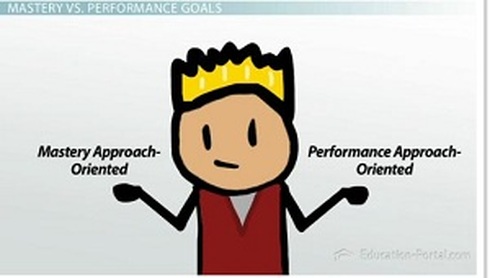
What is Goal Orientation Theory?
The concept of goal orientation emerged in the 1980s from a study conducted with grade level students by Carol Dweck and her colleagues. It examines individuals' approach to, engagement in, and responses to their academic work. Shortly, why and how they strive to accomplish different objectives. The reasons can vary among individuals such as being interested in learning or doing better than others.
Dweck purposed two classes of goals that individuals carry in achievement situations. Research has shown that these goals reveal implications for the tasks students choose, how they approach these tasks, how they react to the outcomes, and in the end, what they learn (Elliot & Dweck, 1988).
1. Learning (Mastery) Goals: Learning oriented students are interested in increasing their competence. As Kaplan and Maehr (2007) state, it refers to "a purpose of personal development and growth that guides achievement-related behavior and task-engagement" (p.151).
2. Performance Goals: Performance oriented students are interested in demonstrating their competence. Studies show that performance-oriented goals foster avoidance of challenging tasks due to anxiety about failure (Dweck & Leggett, 1988).
Dweck (1992) states, "The study of goals has given us a new and useful way of understanding personality and individual differences, and of conceptualizing the interplay of personality and situation. Numerous lines of research now speak to the utility of goal concepts for understanding personality. That is, the study of people's goal tendencies (i.e., their tendencies to pursue certain types of goals and goal strategies) has yielded evidence of relatively consistent and enduring patterns of behavior, ones that play a clear role in the individual's psychological functioning and that are predictors of important life outcomes" (p. 166).
Now, we will analyze some statements which will help us understand students' goal tendencies. By analyzing these, we will be able to find out the role of these goals in their functioning in their academic studies.
Activity: Read the statements below and decide whether a learning oriented or a performance oriented students would say them. (Adapted from Midgley et al. (2000) Manuel for Patterns of Adaptive Learning Scales. University of Michigan)
Click here to see the answers.
To better understand these theories and mindsets, we will look at some studies.
The concept of goal orientation emerged in the 1980s from a study conducted with grade level students by Carol Dweck and her colleagues. It examines individuals' approach to, engagement in, and responses to their academic work. Shortly, why and how they strive to accomplish different objectives. The reasons can vary among individuals such as being interested in learning or doing better than others.
Dweck purposed two classes of goals that individuals carry in achievement situations. Research has shown that these goals reveal implications for the tasks students choose, how they approach these tasks, how they react to the outcomes, and in the end, what they learn (Elliot & Dweck, 1988).
1. Learning (Mastery) Goals: Learning oriented students are interested in increasing their competence. As Kaplan and Maehr (2007) state, it refers to "a purpose of personal development and growth that guides achievement-related behavior and task-engagement" (p.151).
2. Performance Goals: Performance oriented students are interested in demonstrating their competence. Studies show that performance-oriented goals foster avoidance of challenging tasks due to anxiety about failure (Dweck & Leggett, 1988).
Dweck (1992) states, "The study of goals has given us a new and useful way of understanding personality and individual differences, and of conceptualizing the interplay of personality and situation. Numerous lines of research now speak to the utility of goal concepts for understanding personality. That is, the study of people's goal tendencies (i.e., their tendencies to pursue certain types of goals and goal strategies) has yielded evidence of relatively consistent and enduring patterns of behavior, ones that play a clear role in the individual's psychological functioning and that are predictors of important life outcomes" (p. 166).
Now, we will analyze some statements which will help us understand students' goal tendencies. By analyzing these, we will be able to find out the role of these goals in their functioning in their academic studies.
Activity: Read the statements below and decide whether a learning oriented or a performance oriented students would say them. (Adapted from Midgley et al. (2000) Manuel for Patterns of Adaptive Learning Scales. University of Michigan)
- I like class work that I'll learn from even if I make a lot of mistakes.
- I would feel really good if I were the only one who could answer the teacher’s questions in class.
- Doing better than other students in class is important to me.
- An important reason why I do my work in class is because I want to get better at it.
- I like class work best when it really makes me think.
Click here to see the answers.
To better understand these theories and mindsets, we will look at some studies.

